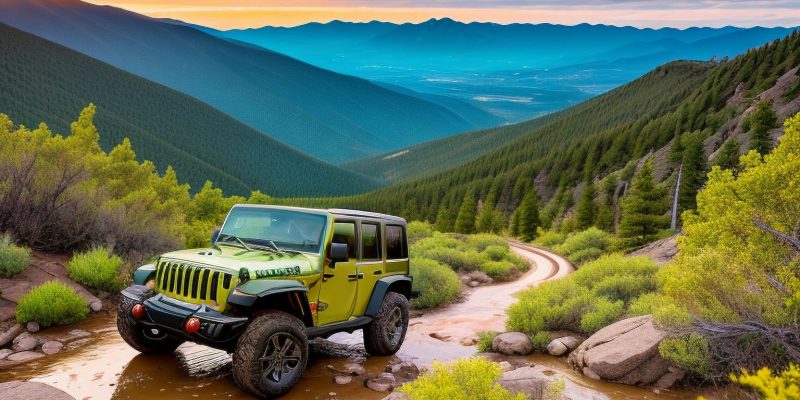When it comes to off-road adventures, Jeeps are known for their ruggedness and capability. However, navigating rough terrains and challenging off-road conditions can put a strain on these vehicles, leading to various problems that can affect their reliability. In this article, we will explore the challenges faced by Jeep owners when driving in rugged terrains and the solutions to ensure their vehicles remain reliable.
Jeep enthusiasts often face a prevalent challenge when venturing off-road, and this issue has been extensively covered on Car Problems Hub. The demanding and uneven terrain can place excessive strain on the engine, resulting in common problems such as overheating, oil leaks, and reduced performance. To effectively tackle these challenges, prioritizing routine engine maintenance is paramount. This maintenance regimen encompasses regular oil changes, diligent filter inspections and replacements, and meticulous monitoring of the cooling system to ensure optimal functionality, all of which are essential for a trouble-free off-road experience.
Another area of concern when it comes to off-road driving is suspension and steering. The constant jolts and impacts can take a toll on the suspension components, leading to problems such as worn-out bushings, bent control arms, and misaligned steering. Regular inspection and maintenance of the suspension system can help prevent these issues. Additionally, investing in upgrades such as heavy-duty shocks and reinforced steering components can provide added durability and reliability.
Off-road tires are another critical component that requires attention. The rough terrains can cause punctures, cuts, and sidewall damage, leading to tire failures. Proper tire maintenance, including regular inspections, tire rotations, and maintaining the correct tire pressure, is essential to ensure optimal performance and minimize the risk of tire-related problems.
When it comes to off-road adventures, the brake system plays a crucial role in ensuring safety. Upgrading the brake system in Jeeps to handle the demands of rugged terrains is highly recommended. This can include installing larger brake rotors, performance brake pads, and upgrading to a high-quality brake fluid. These upgrades can provide better stopping power and prevent brake failures.
Steering stabilization is another aspect that should not be overlooked. Off-road driving often involves navigating through uneven and bumpy terrains, which can result in steering-related problems. Various steering stabilization solutions, such as installing a steering stabilizer or upgrading to a heavy-duty steering system, can enhance control and reduce the risk of steering issues.
The electrical system of Jeeps can also face unique challenges in rugged terrains. Exposure to water, mud, and constant vibrations can lead to electrical issues. It is important to troubleshoot and address any electrical problems promptly. Regular inspection, proper sealing of electrical connections, and using waterproof components can help prevent these issues.
Preventive maintenance is key to keeping Jeeps reliable in rugged terrains. Regular fluid checks and changes for critical components such as the engine, transmission, and differential are essential. Inspecting and reinforcing key components such as the frame, axles, and drivetrain can also ensure they can withstand the rigors of off-road driving.
In conclusion, maintaining the reliability of Jeeps in rugged terrains requires proper care and attention to various aspects of the vehicle. By addressing common Jeep problems such as engine troubles, suspension and steering issues, tire maintenance, brake system upgrades, steering stabilization, electrical system challenges, and practicing preventive maintenance, Jeep owners can ensure their vehicles remain reliable and ready for off-road adventures.
Engine Troubles
When it comes to navigating rough terrains and off-road conditions, Jeep owners often encounter common engine problems that can hinder their adventures. Understanding these engine troubles and knowing how to address them effectively is crucial for maintaining the reliability of your Jeep.
One of the most common engine problems faced by Jeep owners in rugged terrains is overheating. The demanding conditions can put a strain on the engine, causing it to overheat and potentially lead to serious damage. To prevent overheating, it is important to regularly check and maintain the cooling system of your Jeep. This includes checking the coolant levels, inspecting the radiator for any leaks or blockages, and ensuring that the cooling fan is functioning properly.
In addition to overheating, another engine problem that Jeep owners may encounter is oil leaks. Off-road driving can expose the engine to various elements, including rocks, debris, and uneven terrains, which can cause damage to the oil pan or seals. Regularly inspecting the engine for any signs of oil leaks and promptly addressing them can help prevent further damage and ensure the longevity of your Jeep’s engine.
Furthermore, dirty or clogged air filters can also contribute to engine troubles. When driving in rugged terrains, dust, dirt, and other particles can easily enter the engine and clog the air filter, affecting the performance and fuel efficiency of your Jeep. Regularly inspecting and cleaning or replacing the air filter can help prevent engine problems and ensure optimal performance.
By understanding these common engine problems faced by Jeep owners in rugged terrains and taking proactive measures to address them effectively, you can ensure the reliability of your Jeep and enjoy your off-road adventures to the fullest.
Suspension and Steering Issues
Suspension and steering issues are common problems that Jeep owners may encounter when driving in rugged terrains and off-road conditions. These challenges can significantly affect the performance and safety of the vehicle. It is crucial to identify these problems early on and take appropriate measures to prevent or fix them.
One common suspension problem is the wearing out of shock absorbers and struts due to the constant impact and vibrations experienced during off-road adventures. This can lead to reduced stability, increased body roll, and a harsher ride. Regular inspection and replacement of these components are essential to maintain optimal suspension performance.
Another issue that Jeep owners may face is steering instability. Off-road driving can put a strain on the steering system, causing components such as tie rods, ball joints, and steering linkages to wear out or become damaged. This can result in loose or unresponsive steering, making it challenging to maneuver the vehicle. Regular inspection and timely repairs or replacements are necessary to ensure safe and reliable steering.
To prevent suspension and steering problems, it is essential to follow proper maintenance practices. This includes regular inspection of suspension components, such as bushings and control arms, to detect any signs of wear or damage. Additionally, maintaining proper tire pressure and alignment can help minimize stress on the suspension and steering systems.
In cases where suspension or steering issues arise, it is crucial to address them promptly. Seeking professional assistance from experienced mechanics or specialized Jeep service centers can ensure accurate diagnosis and effective repairs. Ignoring these problems can lead to further damage and compromise the overall performance and safety of the vehicle.
In conclusion, identifying and addressing suspension and steering issues is vital for maintaining the reliability of Jeeps in rugged terrains. Regular inspection, proper maintenance, and timely repairs or replacements are key to preventing these problems and ensuring a smooth and safe off-road driving experience.
Off-Road Tire Maintenance
Off-road tires are essential for navigating rugged terrains and ensuring optimal performance. To keep your tires in top shape and minimize the risk of tire-related problems, it is crucial to follow proper maintenance and care techniques. Here are some tips to help you maintain your off-road tires:
- Regular Inspections: Inspect your tires regularly for any signs of damage, such as cuts, punctures, or uneven wear. Address any issues promptly to prevent further damage.
- Proper Inflation: Maintain the recommended tire pressure to ensure optimal performance and prevent uneven wear. Check the tire pressure regularly, especially before embarking on off-road adventures.
- Tire Rotation: Rotate your tires regularly to ensure even wear and extend their lifespan. This helps distribute the workload evenly among all tires.
- Tread Depth: Monitor the tread depth of your off-road tires. Adequate tread depth is crucial for traction and grip on rough terrains. Replace tires that have worn-out treads.
- Cleanliness: Keep your off-road tires clean from dirt, mud, and debris. This not only enhances their appearance but also prevents the accumulation of harmful substances that can degrade the tire rubber.
- Off-Road Tire Protection: Consider using tire protectants or sealants to enhance the durability and resistance of your off-road tires against punctures and cuts.
By following these tips and techniques, you can ensure that your off-road tires perform optimally and minimize the risk of tire-related problems. Proper maintenance and care will not only enhance your driving experience but also extend the lifespan of your off-road tires, saving you money in the long run.
Brake System Upgrades
When it comes to navigating rugged terrains and off-road conditions, having a reliable brake system is crucial for Jeep owners. The demands of these challenging environments can put immense strain on the brakes, making it essential to consider brake system upgrades.
Upgrading the brake system in Jeeps is not just about improving performance, but also about preventing brake failures that can lead to dangerous situations. By investing in high-quality brake components and systems designed specifically for rugged terrains, Jeep owners can enhance their vehicle’s stopping power and overall safety.
One important aspect of brake system upgrades is choosing the right brake pads and rotors. Off-road driving often involves intense braking and high temperatures, so opting for heavy-duty brake pads and slotted or drilled rotors can provide better heat dissipation and reduce the risk of brake fade.
Additionally, upgrading the brake lines to stainless steel braided lines can improve brake pedal feel and responsiveness, ensuring better control when navigating rough terrains. These lines are more resistant to expansion under pressure, resulting in a firmer brake pedal and improved braking performance.
Another consideration for brake system upgrades is the installation of a larger brake master cylinder. This component helps to increase the hydraulic pressure applied to the brake system, allowing for more effective braking power. Combined with upgraded brake pads and rotors, a larger master cylinder can significantly enhance the overall braking performance of a Jeep.
Overall, upgrading the brake system in Jeeps is a wise investment for off-road enthusiasts. By ensuring that the brakes can handle the demands of rugged terrains, Jeep owners can enjoy a safer and more reliable driving experience. Whether it’s choosing the right brake pads and rotors, upgrading the brake lines, or installing a larger master cylinder, these enhancements can make a world of difference when it comes to stopping power and preventing brake failures.
Steering Stabilization Solutions
When it comes to off-road driving, having a stable and responsive steering system is crucial. The rugged terrains and uneven surfaces can put a strain on the steering components, leading to steering-related problems. Fortunately, there are various steering stabilization solutions available that can enhance control and reduce these issues.
One popular solution is the installation of a steering stabilizer. A steering stabilizer, also known as a steering damper, is a device that helps absorb the shocks and vibrations that occur while driving off-road. It acts as a buffer between the steering system and the wheels, minimizing the impact of bumps and obstacles on the steering mechanism. This not only improves control but also reduces the risk of steering-related problems.
Another effective solution is upgrading to a heavy-duty steering system. This involves replacing the stock components with stronger and more durable ones that can withstand the demands of off-road driving. Heavy-duty steering systems often include reinforced steering linkage, upgraded tie rods, and stronger steering boxes. These enhancements provide better stability and responsiveness, ensuring a smoother and more controlled driving experience in rugged terrains.
Additionally, regular maintenance and inspections of the steering system are essential. Checking for any loose or worn-out components, such as ball joints or bushings, can help identify potential issues before they become major problems. Proper lubrication of the steering components is also crucial to ensure smooth operation and minimize wear and tear.
In summary, steering stabilization solutions play a vital role in enhancing control and reducing steering-related problems when driving off-road. Whether it’s installing a steering stabilizer or upgrading to a heavy-duty steering system, these solutions can greatly improve the reliability and performance of your Jeep in rugged terrains.
Electrical System Challenges
When it comes to navigating rugged terrains in a Jeep, owners may encounter unique electrical system challenges. These challenges can range from electrical malfunctions to complete system failures, which can be frustrating and potentially dangerous. However, with the right knowledge and troubleshooting techniques, these issues can be addressed effectively to ensure a reliable and safe off-road adventure.
One common electrical challenge faced by Jeep owners is water damage. When driving through muddy or wet terrains, water can seep into the electrical components and cause short circuits or corrosion. To prevent this, it is important to install waterproof or water-resistant electrical connections and protect vulnerable areas with rubber seals or covers. Regularly inspecting and cleaning these components can also help prevent water-related issues.
Another electrical challenge is the strain on the system caused by additional off-road accessories such as light bars, winches, and GPS systems. These accessories can put a heavy load on the electrical system, leading to battery drain or overheating. To address this, it is crucial to upgrade the electrical system by installing a higher capacity battery, upgrading the alternator, and using heavy-duty wiring. Regularly checking the battery’s charge level and ensuring proper grounding can also help prevent electrical issues.
Furthermore, electrical system challenges can arise from vibrations and shocks experienced during off-road driving. These vibrations can loosen electrical connections and cause intermittent faults or complete failures. To mitigate this, it is important to secure and reinforce electrical connections using zip ties, rubber grommets, or vibration-resistant mounts. Regularly inspecting these connections and tightening any loose ones can help prevent electrical issues on the trail.
In conclusion, addressing the unique electrical system challenges faced by Jeep owners in rugged terrains is essential for a smooth and reliable off-road experience. By taking proactive measures such as waterproofing, upgrading the electrical system, and securing connections, owners can troubleshoot and prevent electrical issues effectively. Regular inspections and maintenance are key to ensuring the longevity and performance of the Jeep’s electrical system in demanding off-road conditions.
Preventive Maintenance Tips
Preventive Maintenance Tips
When it comes to keeping your Jeep in top shape and ensuring its reliability in rugged terrains, preventive maintenance is key. By following a comprehensive guide of maintenance practices, you can minimize the risk of problems and keep your Jeep performing at its best.
Here are some essential preventive maintenance tips to consider:
- Regular Fluid Checks and Changes: It is crucial to regularly check and change the fluids in your Jeep, including the engine oil, transmission fluid, coolant, and differential fluid. This helps maintain optimal performance and prevents potential issues.
- Inspecting and Reinforcing Key Components: Take the time to inspect and reinforce key components such as the frame, axles, and drivetrain. These components undergo significant stress during off-road driving and need to withstand the rigors of rugged terrains.
- Tire Maintenance: Properly maintaining and caring for your off-road tires is essential for optimal performance and minimizing the risk of tire-related problems. Regularly check tire pressure, rotate tires, and ensure they are in good condition.
- Brake System Upgrades: Upgrading the brake system in your Jeep is crucial for handling the demands of rugged terrains. Consider installing high-quality brake pads, rotors, and calipers to prevent brake failures and ensure reliable stopping power.
- Electrical System Troubleshooting: The unique electrical system of Jeeps can face challenges in rugged terrains. Learn how to troubleshoot and prevent electrical issues by inspecting wiring, connections, and ensuring proper grounding.
By following these preventive maintenance tips, you can keep your Jeep in top shape and minimize the risk of problems when navigating rough terrains. Remember, a well-maintained Jeep is a reliable Jeep!
Fluid Checks and Changes
Fluid checks and changes are crucial for maintaining the optimal performance and reliability of critical components in Jeeps. Regularly inspecting and maintaining the fluid levels in your vehicle is essential for ensuring smooth operation and preventing potential issues.
One of the most important fluids to monitor is the engine oil. Engine oil lubricates the moving parts of the engine, reducing friction and heat. It is vital to check the oil level regularly and change it according to the manufacturer’s recommendations. Clean and fresh oil helps to keep the engine running smoothly and prevents excessive wear and tear.
In addition to engine oil, other fluids that require regular checks and changes include transmission fluid, coolant, power steering fluid, and brake fluid. Each of these fluids plays a crucial role in the proper functioning of their respective systems.
Creating a maintenance schedule for fluid checks and changes can help you stay on top of these tasks. Consult your Jeep’s owner manual for specific recommendations on when and how to check and change the fluids. By following these guidelines, you can ensure that your Jeep operates at its best and avoid potential problems that may arise from neglecting fluid maintenance.
Inspecting and Reinforcing Key Components
When it comes to off-road driving, it is crucial to ensure that key components of your Jeep are inspected and reinforced to withstand the rigors of rough terrains. This includes components such as the frame, axles, and drivetrain, which play a vital role in the overall performance and durability of your vehicle.
Inspecting these key components regularly is essential to identify any signs of damage or wear and tear. Start by visually examining the frame for any cracks, rust, or weak spots. Reinforce any weak areas by welding or adding additional support.
Next, focus on the axles, which are responsible for transferring power from the engine to the wheels. Check for any signs of damage, such as bent or broken axles. If any issues are found, it is crucial to replace them promptly to prevent further damage and potential accidents.
The drivetrain is another critical component that needs careful inspection. This includes the transmission, transfer case, and differentials. Look for any leaks, unusual noises, or difficulty shifting gears. Regularly changing the fluids in these components is also essential to maintain optimal performance.
To reinforce these key components, consider upgrading to stronger and more durable parts. This can include installing reinforced axles, heavy-duty frames, or upgraded drivetrain components. These upgrades will help your Jeep withstand the challenges of off-road driving and provide you with a more reliable and capable vehicle.
Frequently Asked Questions
- Q: What are some common engine problems faced by Jeep owners when driving in rugged terrains?A: Some common engine problems include overheating, oil leaks, and air intake issues. These can be caused by the strain of off-road driving and the exposure to dust, dirt, and uneven terrain. Regular maintenance and proper cooling system care can help prevent these problems.
- Q: What are the common suspension and steering issues that arise during off-road adventures?A: Off-road driving can lead to suspension sagging, worn-out shock absorbers, and misaligned steering. These issues can affect the stability and control of the Jeep. Regular inspection and maintenance of suspension components, such as bushings and ball joints, can help prevent these problems.
- Q: How can I properly maintain and care for off-road tires?A: To ensure optimal performance and minimize tire-related problems, it is important to regularly check tire pressure, rotate tires, and inspect for any signs of damage or wear. Additionally, maintaining proper tread depth and using appropriate tire pressure for off-road conditions can enhance traction and durability.
- Q: Why is upgrading the brake system important for Jeeps in rugged terrains?A: Rugged terrains require enhanced braking power and control. Upgrading the brake system can help prevent brake failures and ensure reliable stopping power. This can involve installing larger brake rotors, high-performance brake pads, and upgrading to a more robust braking system.
- Q: What are some steering stabilization solutions available for off-road driving?A: There are various options for steering stabilization, such as installing a steering stabilizer shock, upgrading to a heavy-duty steering box, or adding a steering brace. These solutions help reduce steering-related problems, such as wobbling or loss of control, when navigating rough terrains.
- Q: What are the unique electrical system challenges faced by Jeep owners in rugged terrains?A: The electrical system of Jeeps can be exposed to moisture, vibrations, and extreme temperatures during off-road adventures. This can lead to issues like short circuits, faulty wiring, or electrical component failures. Performing regular inspections, using waterproof connectors, and securing wiring can help prevent these challenges.
- Q: What are some preventive maintenance tips for maintaining Jeeps in rugged terrains?A: It is important to regularly check and change fluids, inspect and reinforce key components, and follow manufacturer-recommended maintenance schedules. Additionally, keeping the Jeep clean, lubricating moving parts, and addressing any issues promptly can help ensure optimal performance and reliability.
- Q: Why are fluid checks and changes important for Jeeps in rugged terrains?A: Fluids, such as engine oil, transmission fluid, and differential oil, play a crucial role in lubricating and cooling critical components. Regular checks and changes help maintain proper levels and ensure the components are protected from excessive heat and wear caused by off-road driving.
- Q: What key components should be inspected and reinforced for off-road driving?A: The frame, axles, and drivetrain are key components that undergo significant stress during off-road driving. Regular inspections for cracks, rust, or any signs of weakness are essential. Reinforcing these components with aftermarket upgrades, such as skid plates or reinforced differential covers, can enhance their durability.









